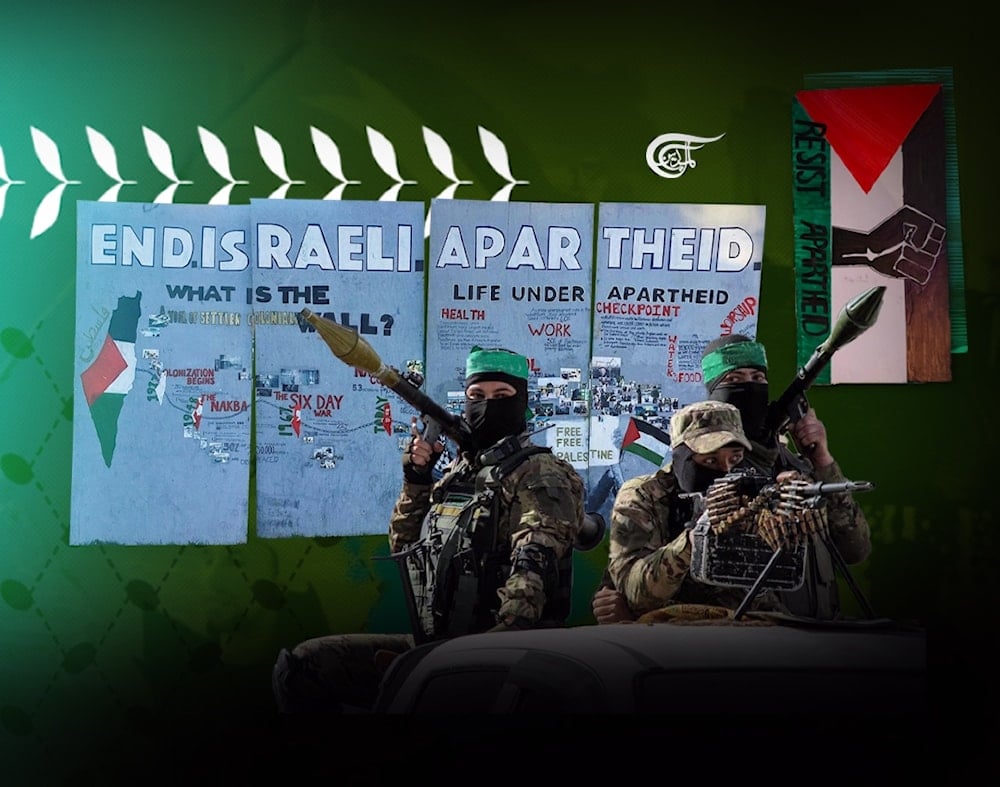Resistance and regime change in occupied Palestine
Tim Anderson argues that dismantling Israel’s apartheid regime is both a legal and moral obligation, requiring coordinated regional resistance, particularly led by Iran, to enforce regime change in historic Palestine.
-

Those in Occupied Palestine, Lebanon, and Syria – directly affected by Israeli occupation and apartheid – can claim their right to armed struggle under a series of UN resolutions. (Al Mayadeen English; Illustrated by Zeinab el-Hajj)
Let’s be clear: Apartheid "Israel" has no ‘right to exist’, international law requires that an apartheid regime be dismantled, and "Israel's" recent, unrepentant genocidal reprisals against civilians in Gaza make even more urgent the case for immediate regime change.
Given that all moral and legal arguments to the regime and its sponsors have fallen on deaf ears, the remaining option is for the regional resistance forces, led by Iran, to inflict a crushing military defeat on the Neo-Nazi regime. That is what is now required to defeat this regional cancer and begin a restructuring of the governance of historic Palestine.
While it is true that the great crimes of the Israeli regime, condemned by multiple international agencies, have destroyed its legitimacy in the eyes of the world, there is little prospect that some political deal will dismantle the racist state.
South Africa in the 1980s was also backed by the Anglo-Americans and also had nuclear weapons, but constant pressure, armed struggle, and some economic compromises led to a deal to dismantle the apartheid regime. There is no sign that such a deal is possible with Apartheid "Israel", which has been emboldened by ongoing support from Washington, Europe, and the comprador Arab regimes.
Recent Western recognition of a ‘Palestinian state’ has extended the right to armed struggle from the right to resist occupation, apartheid and genocide to the right of nation-states to self defence under the UN Charter (Article 51); but the attempts to equate the unelected Palestinian Authority (PA) with this “state” while excluding Resistance factions negates the possibility of self defence and sovereignty.
Independent Polling shows that most Palestinians support the armed resistance and more than 80% want the unelected PA ‘President’ Mahmoud Abbas to resign, a fact which underlines the hopelessness of this “recognition”, especially while Western states keep supporting genocidal "Israel".
The Western attempts to recognise the PA as a Palestinian “state”, one that would be an anti-resistance municipality of "Israel" with no democratic legitimacy, sovereignty or capacity to control its land, its security or its borders, just highlights the need for resistance and a single democratic state in historic Palestine.
Just as democratic South Africans rejected the Bantustan “home lands” proposal in the 1980s, so Palestinians will not accept a fake "Two-State" proposal that acts as a cover for the genocidal, apartheid regime.
That brings us to challenges for the Resistance. How and under what rationales can it impose a crushing defeat on the Zionist military and so force a first stage of regime change?
First, we must recognise that this is beyond the capacity of the Palestinian Resistance factions, by themselves. The various factions, led by Hamas, have bravely maintained pressure on Zionist forces since the stunning Al-Aqsa Flood operation of October 2023. Their persistence and steadfastness has been astonishing. However, direct reinforcement by the NATO states has sustained the Israeli regime and (despite its internal fragilities) prevented collapse.
Second, and due to the limited capacity of the Palestinian Resistance, the role of the regional Resistance is critical. With Syria out of the picture, due to the Turkish-US-Israeli backed HTS (salafi-takfiri) coup, its supply of weapons to the Palestinian and Lebanese resistance has ended. Hezbollah is weakened but rebuilding, and Yemen is now playing a greater role, not only throughthe use of its own hypersonic missiles and drones, but with a volunteer army ready to move directly into a war of liberation. However, it is the Islamic Republic of Iran which can destroy the Israeli military, by itself or in combination with other elements of the regional resistance.
Third, some revised legal rationales are needed for the destruction of the Israeli regime. Iran has always been cautious of direct engagement, for fear of escalation into direct war with the sponsors of the Zionist regime. So far, it has relied on its right to self-defence (Article 51 of the UN Charter) for its retaliatory attacks. Iran even has a much better case for pre-emptive strikes, in self-defence, than the US had for its invasion of Iraq or the Israelis for their attacks on Iran. After the 12-day war in June, which Israelis consider a “success”, they are speaking of a second attack on Iran. Regardless, for diplomatic reasons, Iran has chosen not to rely on “pre-emption”.
The Ansar Allah-led revolutionary government in Yemen (ridiculously termed “Houthi rebels” by Western regimes, who claim the Yemeni “government” is a group of irrelevant exiles in Saudi Arabia) has referred to its obligations under the 1948 Convention on the Prevention and Punishment of the Crime of Genocide as a legal duty reinforcing its moral commitment to support the people of Palestine. As former UN lawyer Craig Mokhiber says, “The U.S. is bombing Yemen because Yemen is acting, as required by international law, to stop the genocide and unlawful siege in Palestine.”
Those in Occupied Palestine, Lebanon, and Syria – directly affected by Israeli occupation and apartheid – can claim their right to armed struggle under a series of UN resolutions in support of the right to self-determination and against occupation, apartheid, and genocide.
However, a central legal rationale for a resistance-imposed regime change in Occupied Palestine is the duty on the international community to dismantle an apartheid regime. This point was made by lawyers Richard Falk and Virginia Tilley in a report prepared for the UN in 2017, where they pointed out that “Apartheid is a crime against humanity. Not only does international law prohibit that crime, it obliges States and international bodies, and even individuals and private institutions, to take measures to combat it wherever it is committed and to punish its perpetrators”.
The escalation problem remains, for Iran, in moving beyond its self-defence rationale into a devastating response to destroy the military capacity of the Zionist regime. The risk of escalation into a war with Washington might be lessened if a democratic front were opened with some of the Israeli groups committed to the dismantling of apartheid. A democratic, unified state which includes Jewish-Israeli residents is, after all, consistent with the long standing Iranian position of an all inclusive referendum on the future of Palestine. Foreign Minister Seyed Abbas Araghchi repeated that position in July 2025.

 Tim Anderson
Tim Anderson
 6 Min Read
6 Min Read











